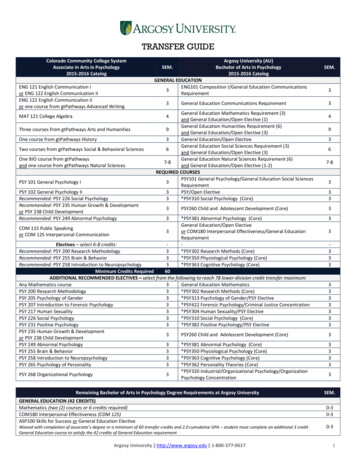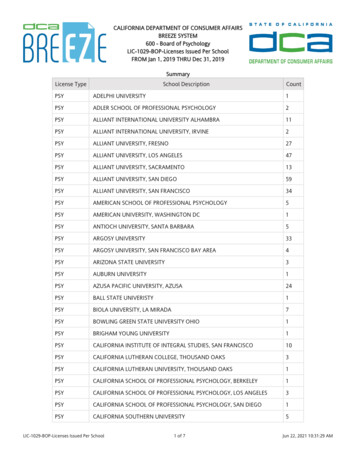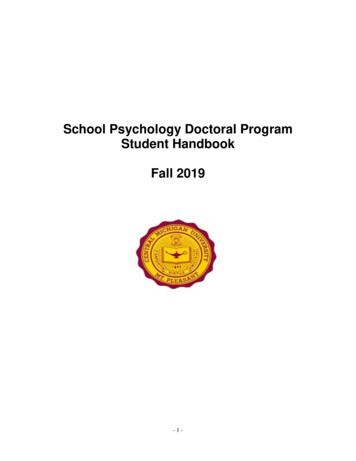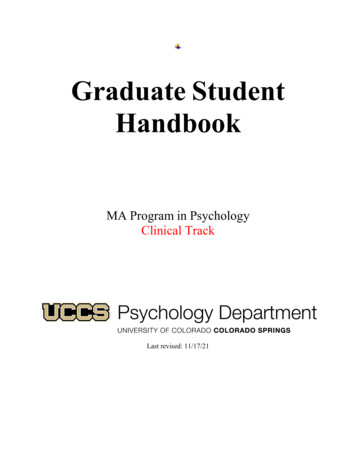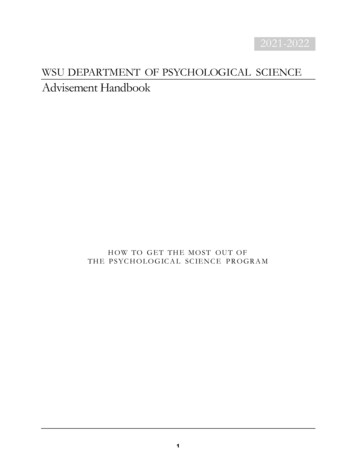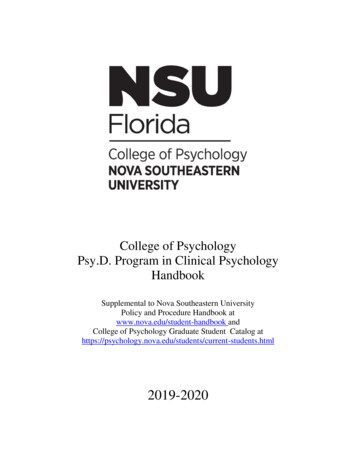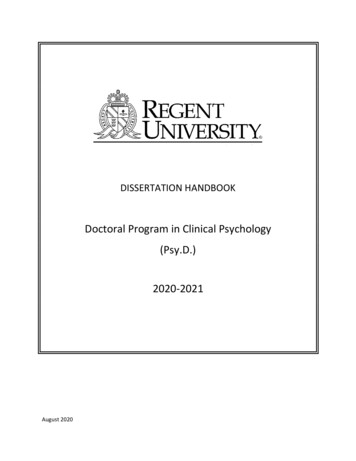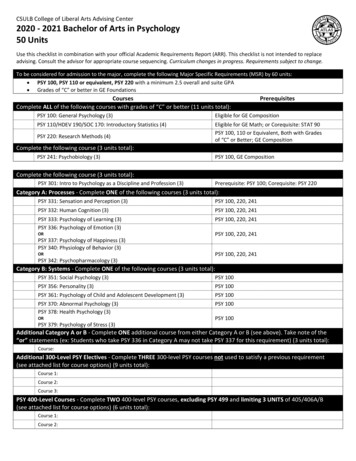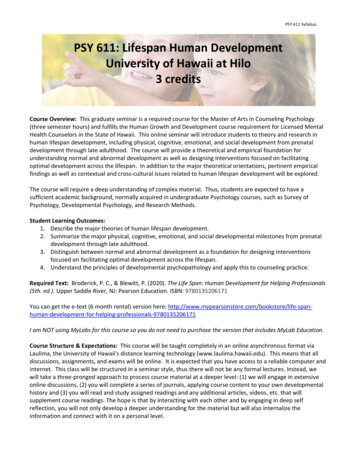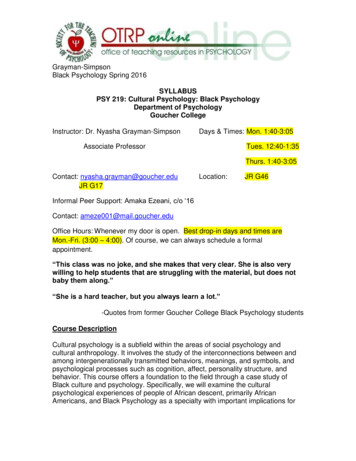
Transcription
Grayman-SimpsonBlack Psychology Spring 2016SYLLABUSPSY 219: Cultural Psychology: Black PsychologyDepartment of PsychologyGoucher CollegeInstructor: Dr. Nyasha Grayman-SimpsonDays & Times: Mon. 1:40-3:05Associate ProfessorTues. 12:40-1:35Thurs. 1:40-3:05Contact: nyasha.grayman@goucher.eduJR G17Location:JR G46Informal Peer Support: Amaka Ezeani, c/o ‘16Contact: ameze001@mail.goucher.eduOffice Hours: Whenever my door is open. Best drop-in days and times areMon.-Fri. (3:00 – 4:00). Of course, we can always schedule a formalappointment.“This class was no joke, and she makes that very clear. She is also verywilling to help students that are struggling with the material, but does notbaby them along.”“She is a hard teacher, but you always learn a lot.”-Quotes from former Goucher College Black Psychology studentsCourse DescriptionCultural psychology is a subfield within the areas of social psychology andcultural anthropology. It involves the study of the interconnections between andamong intergenerationally transmitted behaviors, meanings, and symbols, andpsychological processes such as cognition, affect, personality structure, andbehavior. This course offers a foundation to the field through a case study ofBlack culture and psychology. Specifically, we will examine the culturalpsychological experiences of people of African descent, primarily AfricanAmericans, and Black Psychology as a specialty with important implications for
Grayman-SimpsonBlack Psychology Spring 2016human and social science conceptual paradigms, theory, knowledge productionmethods, and intervention.PSY 219 Cultural Psychology: Black Psychology:Its Fit Into the Goucher College and Goucher Psychology “Big Picture”Goucher College Liberal Education Requirements:“Ways of Knowing & Understanding the World”Goucher College is dedicated to a liberal arts education that prepares studentswithin a broad, humane perspective for a life of inquiry, creativity, and critical andanalytical thinking. Students develop an international outlook, extending liberalarts education beyond Western cultures to encompass the perspectives andachievements of other members of the world community. To achieve thiseducation, students must explore different ways of knowing and understandingthe world Foundations: In the foundational courses, students learn critical thinking,reading, writing, and foreign language skills that will enable them to understandand engage an ever more complex world.Perspectives: In a complex changing world, students need to be prepared tounderstand and evaluate issues from a variety of perspectives using theapproaches of different disciplines.Understanding Diverse Perspectives. (LER - DIV) - Students mustdemonstrate an understanding of the range of human experiences andperspectives across social categories, such as gender, class, race,ethnicity, religious background, able-bodiness, or sexual orientation.Goucher College Psychology Department Mission Statement andProgram Learning ObjectivesPsychology is a diverse and highly interdisciplinary field of study that involves theapplication of systematic methods of inquiry to the exploration of behavior,mental processes, and social relationships. The Department of Psychology hasas its mission to educate students in the core knowledge and skills of thediscipline of Psychology, together with Goucher’s unique perspective that reflectsa history and tradition of respecting diverse viewpoints and methods. Thiseducation contributes to the overall mission of the college as a liberal artsinstitution, “to prepare students within a broad and humane perspective for a lifeof inquiry, creativity, and critical and analytical thinking.”Across the varied perspectives represented in our department, we strive tocreate an open, supportive, challenging and vibrant learning culture. We valuesharing our passion for the field of psychology through close and active2
Grayman-SimpsonBlack Psychology Spring 2016mentoring inside and outside of the classroom. We encourage and modelexperiential learning in the form of community engagement, active involvement inresearch, collaborative construction of knowledge, and self-directed exploration.We provide students with the tools needed for the development of moresophisticated insight into one’s own and others’ behavior and mental processes.Towards these ends, the Psychology Department has identified seven guidingprinciples for its undergraduate curriculum. Our program is designed to facilitatestudents’ development of the following skills and knowledge:Psychology Learning Objective 1: Demonstrate understanding andcompetence regarding the use of research methodology in psychology.Psychology Learning Objective 2: Communicate effectively as it pertains to thestudy and practice of psychology.Psychology Learning Objective 3: Engage the world outside the classroom touse and/or inform one’s knowledge of psychology.Psychology Learning Objective 4: Demonstrate understanding of the majorconcepts, theoretical perspectives, empirical findings, and historical trends inpsychology.Psychology Learning Objective 5: Develop critical consciousness and anappreciation of a variety of ways of knowing.Psychology Learning Objective 6: Recognize, understand, and respect thecomplexity of sociocultural and international diversity as played out in psychologyand related fields.Psychology Learning Objective 7: Develop an ethical framework with regard tothe study and practice of psychology.Current Course Objectives:(1) Demonstrate a developed understanding of “deep culture,” national andtransnational cultural identities, cultural enclaves, and subcultural/countercultural identities through reflective learning journal entries and in-classcommunicative exchanges that are accurate with respect to explanation oflower-level/foundational concepts, and rich with respect to higher-level flexiblecritical analysis.Diverse Perspectives Liberal Education Requirement Learning Objective 1.Describe worldview(s) under study3
Grayman-SimpsonBlack Psychology Spring 2016Diverse Perspectives Liberal Education Requirement Learning Objective 2.Explain primary causes or contextual factors contributing to the worldview(s)under study, which may include social, political and economic dominance.Psychology Department Learning Objective 6. Recognize, Understand, andRespect the Complexity of Sociocultural and International Diversity as Played outin PsychologyPsychology Department Learning Objective 5. Develop CriticalConsciousness and an Appreciation of Variety of Ways of Knowing(2) Demonstrate increased insight into self and others as cultural beings throughreflective learning journal entries and in-class communicative exchange thatis rich with respect to critical self-reflection.Diverse Perspective Liberal Education Requirement Learning Objective 3.Analyze differences between two or more worldviews, using methods andterminology appropriate to the disciplinesPsychology Learning Objective 6. Recognize, Understand, and Respect theComplexity of Sociocultural and International Diversity as Played out inPsychologyPsychology Department Learning Objective 5. Develop CriticalConsciousness and an Appreciation of Variety of Ways of Knowing(3) Demonstrate an understanding of ethical research practices within the field ofcultural psychology through reflective learning journal entries andcommunicative exchange that is accurate with respect to lowerlevel/foundational research concepts, and rich with higher-level criticalanalysis.Psychology Department Learning Objective 1. Demonstrate Understanding ofResearch Methodology in PsychologyPsychology Department Learning Objective 7. Develop an EthicalFramework with Regard to the Study and Practice of Psychology.Basic Student Conduct RequirementsAdherence to the Academic Honor Code – As a student at Goucher, you arerequired to adhere to the College Academic Honor Code. The Honor Code helpsto maintain the academic and intellectual integrity of the institution, andultimately, the value of a Goucher education. You will receive a copy ofimportant sections of this code. Please read it carefully. As mandated, I willreport all suspected violations of the Honor Code (intentional and unintentional).4
Grayman-SimpsonBlack Psychology Spring 2016Non-engagement in Disruptive Classroom Behavior – Goucher is an institution ofhigher learning. Behavior that interferes with, disrupts, or obstructs the learningprocess will not be tolerated. Some of these behaviors include, “talking orotherwise making excessive noise or showing disrespect when a teacher oranother student is speaking; repeatedly interrupting other students or theprofessor; refusing to interact with other members of the class when group workis required; coming to class under the influence of alcohol or illegal drugs.” Youwill receive a copy of the General Handbook section titled, “Guidelines forClassroom Behavior and Procedures for Expulsion from Class.” Please read itcarefully.Required Texts1. Ani, M (2004). Let the circle be unbroken: The implications of Africanspirituality in the Diaspora. New York: Nkonimfo Publications. (PurchaseUsed From Amazon or Alibris)2. Garrod, A., Ward, J. V., Robinson, T. L., & Kilkenny, R. (1999). Soulslooking back: Life stories of growing up Black. New York: Routledge.3. Garrod, A., Kilkenny, R., & Gomez, C. (2014). Mixed: Multiracial collegestudents tell their life stories. New York: Cornell University Press.4. American Psychological Association. (2009). Publication manual of theAmerican Psychological Association, 6th Edition. American PsychologicalAssociation.5. Reading Packet Posted on GoucherLearn (Please Print Chapter BeingDiscussed and Bring To Class)Grayman-Simpson, N. (2015). Cultural identity. Encyclopedia for Clinical andAbnormal Psychology. Thousand Oaks, CA: SAGE. (In Press).Gomez, M. A. (1998). Vesey’s challenge. In Exchanging our country marks: Thetransformation of African identities in the colonial and antebellum South.University of North Carolina Press.Bynum, E. B. (1999). Introduction and Ch. 2 In The African unconscious: Rootsof ancient mysticism and modern psychology. New York: TeachersCollege Press.Mattis, J. S. (1998). Bridging spirituality and psychotherapy. In R. L. Jones (Ed.),African American mental health: Theory, research, and intervention (pp.555-566). Hampton, VA: Cobb & Henry Publishers.5
Grayman-SimpsonBlack Psychology Spring 2016Leary. D. J. (2005). Post traumatic slave syndrome. In Post traumatic slaveSyndrome: America’s legacy of enduring injury and healing (pp. 114 –146). Milwaukie, OR: Uptone Press.Alsbrook, A. (2005). Remembering our past: A Tribute to Kenneth B. Clark andMamie Clark. Communique. Retrieved January, 2015 e/2005/07/julyspecial.pdfBrown, K. T., Ward, G. K., Lightbourn, T., & Jackson, J. S. (1999). Skin toneand racial identity among African Americans: A theoretical and researchframework. In R. L. Jones (Ed.), Advances in African AmericanPsychology, (pp. 191 – 214). Hampton, VA: Cobb & Henry Publishers.Jackson-Lowman, H. (2004). Sankofa: A mental health imperative for the 21stCentury. In R. Jones (Ed.), African American mental health: Theory,research, and intervention (pp. 51 – 69). Hampton, VA: Cobb & HenryPublishers.Maat, S. R. E. K. (2010). Words of wisdom for building eternity: An interviewwith African-centered psychologist Linda James Myers. Journal of PanAfrican Studies, 3(7), 194 – 203.Clark, C. (1972). Black studies or the study of Black people? In R. L.Jones (Ed.), Black psychology, (pp. 3 – 17). New York: Harper & RowPublishers.Cross, W., Parham, T., & Helms, J. (1998). Nigrescence revisited: Theory andResearch. In R. L. Jones (Ed.), African American identity development(pp. 3 – 71). Hampton, VA: Cobb & Henry Publishers.Stevenson, H. & Davis, G. (2004). Racial socialization. In R. Jones (Ed.), Blackpsychology (4th ed), (pp. 353-381). Hampton, VA: Cobb & HenryPublishers.Sellers, R., Shelton, N., Cooke, D., Chavous, T., Rowley, S., & Smith, M. (1998).A multidimensional model of racial identity: Assumptions, findings, andfuture directions. In R. L. Jones (Ed.), African American identitydevelopment (pp. 275 – 302). Hampton, VA: Cobb & Henry Publishers.Landrine, H., & Klonoff, E. (1996). Toward a theory of African Americanacculturation. In African American acculturation: Deconstructing race andreviving culture (pp. 40 – 61). Thousand Oaks, CA: SAGE.Richardson, T. (1998). Continuity in the identity development process for African6
Grayman-SimpsonBlack Psychology Spring 2016Americans and Africans throughout the Diaspora. In R. L. Jones (Ed.),African American identity development (pp. 73 – 83). Hampton, VA: Cobb& Henry Publishers.Renn, K. (2008). Research on biracial and multiracial identity development:Overview and synthesis. New Directions for Student Services, 123, 13 –21.Hilliard, A. (1995). Conceptual confusion and the persistence of groupoppression through education. In The Maroon within us: Selected essayson African American community socialization (pp. 142 – 159). Baltimore,MD: Black Classic Press.Sawyer, T. F. (2000). Francis Cecil Sumner: His views and influence onAfrican American higher education. History of Psychology, 3, 122–41.Benjamin, L.T., Henry, K.D., & Mcmahon, L.R. (2005). Inez Prosser and theeducation of African Americans. Journal of the History of the BehavioralSciences, 41(1), 43-62.Akbar, N. (2011). Education: Vehicle for transmission of consciousness. In KnowThyself (pp. 1 – 15). Tallahassee, FL: Mind Productions & Associates.Williams, R. L. (1980). The death of White research in the Black community. InR. L. Jones (Ed.), Black psychology, 2nd Edition, (pp. 403 - 417). NewYork: Harper & Row Publishers.Caldwell, C., Jackson, J., Tucker, M., & Bowman, P. (1999). Culturallycompetent research methods. In R.L. Jones (Ed.), Advances in AfricanAmerican psychology (pp. 101 – 126). Hampton, VA: Cobb & HenryPublishers.Guthrie, R. V. (1980). The psychology of Black Americans: An historicalperspective. In R. L. Jones (Ed.), Black psychology, 2nd Edition, (pp. 13 –22). New York: Harper & Row Publishers.Baldwin, J. (1979). If Black English Isn’t A Language, Then Tell Me, What Is?Retrieved January, 2015 /baldwin-english.htmlMajors, R. (1991). Nonverbal behaviors and communication styles amongAfrican Americans. In R. L. Jones (Ed.), Black Psychology, (pp. 269 –294). Hampton, VA: Cobb & Henry Publishers.Boyd-Franklin, N. (2004). A Multisystems Approach to Home and Community7
Grayman-SimpsonBlack Psychology Spring 2016Based Interventions with African American Poor Families. In R. L. Jones(Ed.), African American mental health: Theory, research, and intervention(pp. 315 – 328). Hampton, VA: Cobb & Henry Publishers.Nobles, W. (1972). African philosophy: Foundations for Black Psychology. In R.L. Jones (Ed.), Black psychology, (pp. 18-32). New York: Harper & RowPublishers.Franklin, A.J. (2004). The twelve lessons of empowerment and Moving on InFrom brotherhood to manhood: How Black men rescue their relationshipsand dreams from the invisibility syndrome (pp. 183 – 216). Hoboken, NJ:Wiley & Sons.Jenkins, Y. (2000). The Stone Center theoretical approach revisited: Applicationsfor African American women in Psychotherapy with African Americanwomen: Innovations in psychodynamic perspectives and practices (pp. 62– 81). New York: Guilford Press.White, A. (2006). African American feminist masculinities: Personal narratives ofredemption, contamination, and peak turning points. Journal ofHumanistic Psychology, 46(3), 255 – 280.Greene, B. (2009). African Americn lesbians and gay men: Life between a rock and a hardplace. In H.A. Neville, B.M. Tynes, & S. O. Utsey (Eds.), Handbook of AfricanAmerican Psychology (pp. 311 – 331). Thousand Oaks, CA: SAGE.General Course RequirementsAttendanceYou are expected to attend all classes on time and to arrive prepared. If you find yourselfmissing more than two classes (excused or unexcused), you need to seriouslyconsider withdrawing from this course, as staying on pace with the class will likelyprove too difficult. Death in the family, participation in religious holidays, involvement inschool-sponsored activities, and illnesses requiring medical attention are some examples ofexcused absences. Absence due to illness must be substantiated in writing by the treatingprofessional in order to be considered excused. Unexcused absences will have a negativeimpact on your grade. Work missed due to unexcused absences will not be acceptedand will not receive any credit.ParticipationYou are expected to actively participate once here. Active participation includes:constructive engagement in class discussions and activities, completion of all8
Grayman-SimpsonBlack Psychology Spring 2016outside class work as assigned, pursuit of academic support from the professorand/or ACE as needed, taking responsibility and being self-accountable for youracademic work, and engagement in mutually respectful relationships with theprofessor and peers.Course Requirements1. Assignments – 60 pts.2. Final Reflection Paper – 20 pts.3. In-Class Participation – 20 pts.Assignments/Reflective Journaling – Adapted from “Becoming areflective learner”In this class you will be an active learner, a participant in a community,engaged in dialogue with your group facilitator and cohort members.Equally important, you will engage in a form of dialogue with yourself, asyou become a reflective learner. Your responses to reading questionsand additional thoughts/feelings on how the in-class readings anddiscussions connect to each other as well as learning experiencesyou are having/have had in different classes, on campus, and in lifeoutside of campus should be recorded in your journal. You will beasked to submit your journal for review at the end of each week; and,you should expect to share/paraphrase excerpts from your journalduring class discussions. A sample exemplary journal entry is postedon GoucherLearn. Point allocations for each assignment are also postedon GoucherLearn in Gradebook. Producing a high-quality structured finalreflection essay will require reliance on your journal entries. Moreinformation about reflective journaling for this class can be found onGoucherLearn. Instructions for all assignments are included at the end ofthis syllabus.More on reflective learning journals:Reflection is a practice that facilitates the exploration, examination andunderstanding of what we are feeling, thinking and learning. It is a thoughtfulconsideration of academic material, personal experiences and interpersonalrelationships. Reflection is a form of internal inquiry that extends the relevance of9
Grayman-SimpsonBlack Psychology Spring 2016theory and deepens our understanding of the practice of our everyday life andwork.Through reflection we challenge our assumptions, ask new questions and tryto make sense of our experiences. We become active creators (and cocreators) of our own knowledge. As reflective learners we test our informaltheories (those that we develop through our experiences as practitioners inthe world) against formal theories (those that are developed by researchersand academics). We integrate theory and practice through a process ofreflection-on-action, i.e. trying to make sense of experience after the fact andreflection-in-action, i.e. trying to make sense of experience while it isoccurring (Schon, 1987).The practice of reflective learning can take many different forms. For thisclass you are being asked to keep a reflective journal in which you record andconsider the following concerning the readings: how they have helped you tomake sense of an experience; the questions they have triggered for you;whether you agreed or disagreed with the material; how you have reacted toit; and, whether your understanding of a personal or work-related situationchanged after studying them. In addition to writing, your reflections mayinclude doodles, pictures, poems, news clipping, quotes, and mind-maps.Final Reflection Paper – For this assignment you will write a reflectionessay discussing how what you have learned in this course has influencedyour understanding of yourself as a cultural being. This essay should alsocompare and contrast your new understanding of yourself as a culturalbeing with your new knowledge of Black African people as a culturalgroup. Finally, this reflection essay should discuss your understanding ofthe application of cultural psychological concepts covered in this class tothe study of other cultural groups. Your writing should conform to theguidelines set forth in chapters three and four with particular attention paidto sections 3.05, 3.06, 3.08, 3.09, 3.18, 3.19, 3.20, 3.21, 3.22, 3.23, 4.03,4.04, 4.05, 4.06, 4.12, 4.13, 4.21, 4.26, 4.31, and 4.32. There is no pagelimit for this assignment. A sample exemplary final reflection paper isposted on GoucherLearn.10
Grayman-SimpsonBlack Psychology Spring 2016In-Class Participation – At the end of the semester, you will be asked toreflect upon your participation, using a guideline provided at the end of thissyllabus. I, in turn will review your evaluations and qualitative elaborationsand either agree or disagree with your self-assessment based on mysubjective perceptions of the quality of your participation. Mydisagreement with your self-evaluation may call for either a higher or lowerrating of your participation. In instances of disagreement, I will provideyou with a written counter-justification. A sample exemplary in-classparticipation reflection is posted on GoucherLearn.Grading Philosophy– In my courses, points are earned. Everyone starts with azero and earns his/her own grade based on demonstrated mastery of thematerial. You do not start with a 100 and lose points based on incompetence.Grading Rubric (Total Possible Points 100)95 – 100 (A) 86 – 89 (B ) 76 – 79 (C ) 66 – 69 (D ) 59 (F)90 – 94 (A-) 83 – 85 (B) 73 – 75 (C) 63 – 65 (D)80 – 82 (B-) 70 – 72 (C-) 60 – 62 (D-)11
Grayman-SimpsonBlack Psychology Spring 2016WeekMondayTuesdayThursday1 (Jan.25-28)1. Nyasha Grayman-Simpson “CulturalIdentity”2. Blacks In Wax Museum Discussion3. “In Motion: The African AmericanMigration Experience” &Blacks in Wax Museum (Full ClassPeriod)2 (Feb.1-4)3 (Feb.8-11)“Vesey’s Challenge in Exchanging OurCountry Marks” Discussion4. Marimba Ani “Let The Circle BeUnbroken”5. Edward Bruce Bynum The AfricanUnconsciousScoring Worldview Analysis Scale &DiscussionEdward Bruce Bynum “The AfricanUnconscious Introduction and Ch. 2Discussion”7. Lecture DeGruy Leary Post TraumaticSlave Syndrome &8. CNN Kids On Race Screening &DeGruy Leary “Post Traumatic SlaveSyndrome Ch. 4” Discussion[Negative/Positive Associations withWord Black]“Remembering Our Past: Legacy ofKenneth and Mamie Clark” Discussion25 min.126. This Far By Faith;Black Folk Don’t Do Atheism Screening; andJacqueline Mattis “Bridging Spirituality andPsychotherapy Discussion”9. Cheryl “Grills Dark Girls”: Issue OfColorism Screening,Black and Latino Screening &[Chronosystem & Ecology of Development]Colorism, Brown et al. “Skin Tone and RacialIdentity among African Americans: ATheoretical and Reseasrch Framework”Discussion
Grayman-SimpsonBlack Psychology Spring 20164 (Feb.15-18)10. Film Sankofa &Huberta Jackson-Lowman “Sankofa: AMental Health Imperative for the 21stCentury” Discussion5 (Feb.22-25)13. ABPsi Lecture William CrossSegment Screening&William Cross, Thomas Parham, JanetHelms “Nigrescence Revisited: Theoryand Research” Discussion11. Linda James Myers ABPsi LectureScreening &12. Joe White ABPsi Interview SegmentScreening &Linda James Myers “Words of WisdomFor Building Eternity: An Interviewwith African-centered PsychologistLinda James Myers” Discussion[Epistemologies]14. [J&J Racial Socialization] HowardStevenson & Gwendolyn Davis “RacialSocialization” Discussion15. Robert Sellers, Nicole Shelton, DeannaCooke, Tabbye Chavous, Stephanie Rowley,& Mia Smith “A Multidimensional Model ofRacial Identity: Assumption, Findings andFuture Directions” &Cedrik Clark “Black Studies Or The Study ofBlack People?” Discussion[8 item] Scoring Multidimensional Inventoryof Black Identity & Discussion6 (Mar.1-4)16. Psychology’s Feminist Voices HopeLandrine,17. What’s In A Name? Presentations& DiscussionGoucher Library Ebook Ch. 2 HopeLandrine “Toward A Theory of AfricanAmerican Acculturation”[Acculturation] Scoring AcculturationStrategies For People of African1318. Cultural Genogram Presentations &Discussion
Grayman-SimpsonBlack Psychology Spring 2016Descent Scale Discussion19. “The Neo African Americans”Documentary Screening &20. [Census Activity] CNN Who Is BlackIn America? Screening &[Standpoint/Paradigm] Tina Richardson“Continuity in the IdentityDevelopment Process for AfricanAmericans and Africans Throughoutthe Diaspora” DiscussionKristen Renn “Research On Biracialand Multiracial Identity Development:Overview and Synthesis” Discussion8 (Mar.15-18)SPRING BREAKSPRING BREAKSPRING BREAK9 (Mar.22-25)22. Patsy Jo Hilliard on Late HusbandAsa Hilliard Screening&23. [History of Black Psychology &Schools of Thought] “Francis CecilSumner and His Views And InfluenceOn American Higher Education”24. Na’im Akbar ABPsi Interview &7 (Mar.8-11)[Zinn’s People’s History] “ConceptualConfusion and the Persistence ofGroup Oppression Through Education”Discussion10 (Mar.29Apr.1)25. The Deadly DeceptionDocumentaryRobert Williams “Death To WhiteResearch In The Black Community” &21. Racial Autobiography Presentations &DiscussionNa’im Akbar from Know Thyself “Education:Vehicle for Transmission of Consciousness”“Inez Prosser and the Education ofAfrican Americans”26. Robert Guthrie “The Psychology ofAfrican Americans: A HistoricalPerspective” DiscussionCleopatra Caldwell, James Jackson, M.Belinda Tucker, Phillip Bowman“Culturally-Competent Research1427. Film Selma &Intergenerational Interview with Elder (65yrs ) on Race Relations With Black PeoplePresentations & Discussion
Grayman-SimpsonBlack Psychology Spring 2016Methods” Discussion11 (Apr.5-8)28. Robert Williams ABPsi InterviewScreening29. “Do You Speak American?”Screening & Discussion 20 min.30. Edward J Barnes “The Black CommunityAs A Source of Positive Self-Concept forAfrican American Children” Discussion32. Wade Nobles ABPsi Interview33. Anderson J Franklin ABPsi Interview&Wade Nobles “African Philosophy:Foundations For Black Psychology”AJ Franklin “Moving On: From Brotherhoodto Manhood – The Twelve Lessons ofEmpowerment”James Baldwin “If Black English Isn’t ALanguage Then Tell Me What Is?”Discussion“African American Non-VerbalBehaviors and Communication Styles”12 (Apr.12-15)31. Nancy Boyd Franklin ABPsiInterviewNyasha Grayman-Simpson “CulturallyCompetent Treatment”Nancy Boyd Franklin “A MultisystemsApproach to Home and CommunityBased Interventions with AfricanAmerican Poor Families”Moving On: “From Brotherhood toManhood – Strategies for Moving On”Discussion15
Grayman-SimpsonBlack Psychology Spring 201613 (Apr.19-22)34. Online Rutgers UniversityConference: Black Women inPsychology: The Challenges andPerspectives &35. Psychology Feminist VoicesAaronette White Interview&36. Psychology Feminist Voices BeverlyGreeneAaronette White “African AmericanFeminist Masculinities: PersonalNarratives of Redemption,Contamination and Peak TurningPoints” DiscussionBeverly Greene Handbook of AfricanAmerican Psychology “African AmericanLesbians and Gay Men: Life Between a Rockand a Hard Place” Discussion37. Mixed: Multiracial College StudentsTell Their Life Stories:38. Souls Looking Back: Life Stories ofGrowing Up Black:39. *The African Americans: Many Rivers ToCross Part I & IIAna Sofia – “Good Hair”Chantal – “Gotta Keep Climbin All deTime”Yvonne Jenkins Ch. 4 Psychotherapywith African American WomenAvailable on Google Book “The StoneCenter Theoretical Approach Revisited:Applications for African AmericanWomen” Discussion14 (Apr.26-29)Saiir – “Finding Blackness”Allison – “A Sort of Hybrid”Rick – “Feeling The Pressure ToSucceed”Stacey – “Running Hurdles”15 (May 3-6)40. *The African Americans: ManyRivers To Cross Part III & IV41. *The African Americans: ManyRivers To Cross Part V & VI1642. Final Reflection Paper DueFinal Process ; Course Evaluations
Grayman-SimpsonBlack Psychology Spring 2016Course Schedule & Assignment DetailsWeek 1 AssignmentsFor Class 1. Read Nyasha Grayman-Simpson Cultural IdentityCarpool to the Great Blacks in Wax Museum for class.Great Blacks in Wax Museum1601 East North AvenueBaltimore, MD 21213410-563-3404For Class 2. In one single-spaced page, answer the following:Q1. What personal feelings and thoughts were triggered by this tour?Q2. What visual images from the tour will likely stay with your?Q3. Why do you think I required the class to take this tour at the beginning of a course on Black Psychology? What is it that you think I want youto take away from this experience?Q4. What do you hope to get out of this class experience?For Class 3. Read In Motion: The African American Migration Experience: Trans Atlantic Slave Tradea. Overview igration 1&topic 1&tab image&bhcp 1b. The Development of The Trade igration 1&topic 2&tab imagec. Capture and Enslavement igration 1&topic 3&tab imaged. Traders and Trade igration 1&topic 4&tab imagee. The Middle Passage igration 1&topic 5&tab imagef.Africans in America igration 1&topic 6&tab image17
Grayman-SimpsonBlack Psychology Spring 2016g. Ethnicities in the United States igration 1&topic 7&tab imageh. The Suppression of the Slave Trade http://www.inmotionaame.org/migr
study and practice of psychology. Psychology Learning Objective 3: Engage the world outside the classroom to use and/or inform one's knowledge of psychology. Psychology Learning Objective 4: Demonstrate understanding of the major concepts, theoretical perspectives, empirical findings, and historical trends in psychology.
